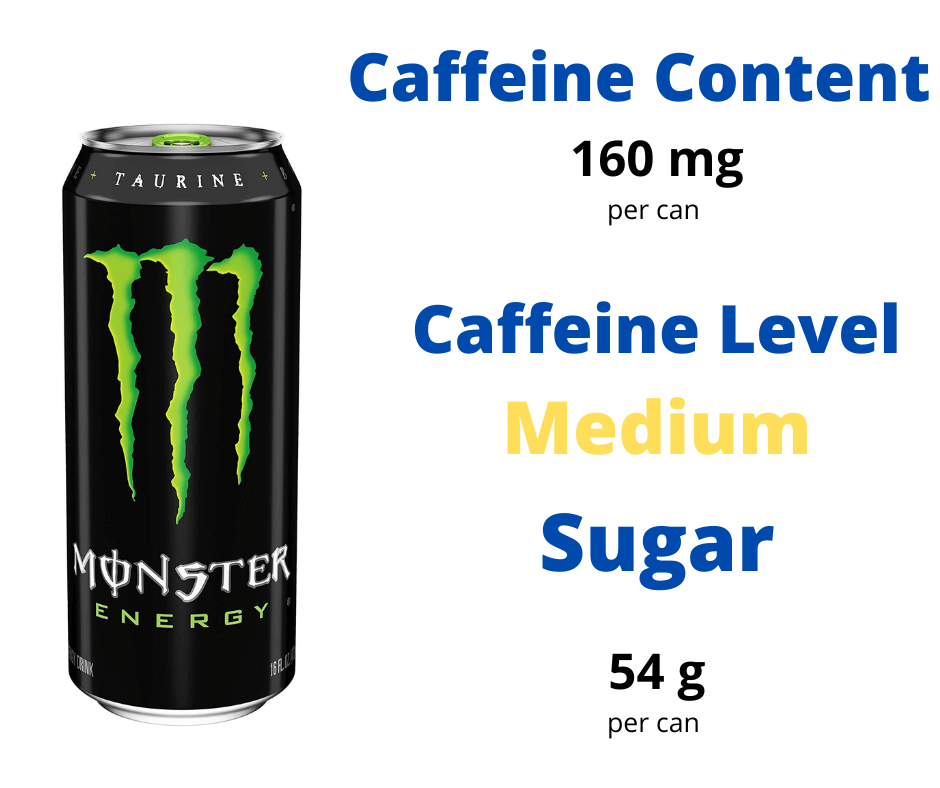How Much Caffeine in Monster: Unveil the Buzz!

How Much Caffeine in Monster? Monster energy drinks contain approximately 160mg of caffeine per 16 fl oz can. With its high caffeine content, Monster is known for providing a significant energy boost to its consumers.
These popular beverages are often favored by individuals seeking a quick pick-me-up or an extra jolt of energy during the day. However, it is essential to consume them in moderation, as excessive caffeine intake can have adverse effects on health.
In this blog post, we will explore the caffeine content of Monster energy drinks, its potential benefits and drawbacks, and provide tips for consuming them responsibly. So, if you’re curious about how much caffeine is in Monster and want to learn more, keep reading!

Credit: www173.rtaf.mi.th
Introduction To Monster Energy
Monster Energy is a popular energy drink that is consumed by millions of people worldwide. The drink was first introduced in the United States in 2002 and has since gained immense popularity due to its unique taste and energizing properties. In this blog post, we will discuss the origins and popularity of Monster Energy, as well as the caffeine content of the drink.
Origins And Popularity
Monster Energy was created by Hansen Natural Corporation, which is now known as Monster Beverage Corporation. The drink was initially introduced in the US, but it quickly gained popularity in other countries as well. Today, Monster Energy is sold in over 100 countries worldwide and is one of the most popular energy drinks on the market.
One of the reasons why Monster Energy has become so popular is because of its unique taste. Unlike other energy drinks that have a medicinal taste, Monster Energy has a sweet and refreshing flavor that appeals to a wide range of consumers. Additionally, Monster Energy has been marketed as a drink that provides a burst of energy, making it a popular choice among athletes, students, and professionals.
The Energy Drink Market
The energy drink market has experienced significant growth over the past decade, with more and more consumers turning to energy drinks to help them stay alert and focused throughout the day. According to a report by Research and Markets, the global energy drinks market is expected to grow at a CAGR of 7.20% during the forecast period 2020-2025.
One of the reasons for the growth of the energy drink market is the increasing demand for beverages that provide an instant energy boost. In today’s fast-paced world, consumers are looking for products that can help them keep up with their busy schedules and demanding lifestyles. Energy drinks like Monster Energy provide a quick and easy way to get a burst of energy when needed.
Caffeine Content Of Monster Energy
Monster Energy contains caffeine, which is a natural stimulant that helps to increase alertness and reduce fatigue. The caffeine content of Monster Energy varies depending on the flavor and size of the drink. A regular 16 oz can of Monster Energy contains around 160 mg of caffeine, while a 24 oz can contains around 240 mg of caffeine. It is important to note that excessive consumption of caffeine can have negative health effects, including increased heart rate and blood pressure.
In conclusion, Monster Energy is a popular energy drink that has gained widespread popularity due to its unique taste and energizing properties. The energy drink market has experienced significant growth in recent years, and Monster Energy is one of the most popular drinks in this category. While the caffeine content of Monster Energy can provide a quick and easy energy boost, it is important to consume the drink in moderation to avoid negative health effects.
Caffeine Content In Monster
Monster energy drinks contain varying levels of caffeine, with regular cans typically having around 160mg per 16 fl oz. The ultra-caffeinated “Monster Energy” variant can pack a powerful 240mg in a 16 fl oz can. Be mindful of your caffeine intake to avoid consuming too much in one go.
Comparing To Coffee And Soda
Variations Across Flavors
The caffeine content in Monster Energy drinks varies across flavors. Here is a breakdown of the caffeine levels in some popular Monster variants: | Monster Flavor | Caffeine Content (per 16 oz can) | |———————|———————————| | Original | 160 mg | | Ultra Blue | 140 mg | | Absolute Zero | 140 mg | | Ultra Red | 140 mg | | Rehab | 161 mg |
- Original Monster has the highest caffeine content.
- Rehab variant offers a slightly higher caffeine kick.
- Ultra Blue, Ultra Red, and Absolute Zero have similar caffeine levels.
Comparing To Coffee And Soda
When compared to coffee and soda, Monster Energy drinks generally contain more caffeine per serving:
- A typical 16 oz can of Monster has around 160 mg of caffeine.
- In contrast, an 8 oz cup of coffee has approximately 95 mg of caffeine.
- Sodas like Coke or Pepsi have significantly lower caffeine levels.
Health Implications Of Caffeine
Monster energy drinks contain high levels of caffeine, with about 160mg per 16 fl oz can. Excessive caffeine intake can lead to insomnia, jitteriness, increased heart rate, and even dependency. Monitoring caffeine consumption is crucial for maintaining overall health and well-being.
Safe Limits For Consumption
Caffeine is a widely consumed stimulant found in various beverages, including energy drinks like Monster. Understanding the safe limits for caffeine consumption is crucial to prevent potential health risks. According to the FDA, the recommended daily intake of caffeine for most healthy adults is up to 400 milligrams (mg), which is roughly equivalent to four cups of coffee. However, it’s important to note that individual tolerance to caffeine can vary, and some people may be more sensitive to its effects.
Potential Side Effects
While moderate caffeine consumption is generally considered safe for most individuals, exceeding the recommended limits can lead to various side effects. These can include:
- Insomnia or difficulty sleeping
- Increased heart rate and palpitations
- Restlessness and irritability
- Headaches
- Stomach discomfort or digestive issues
- Increased blood pressure
- Dehydration
- Anxiety or nervousness
It’s important to monitor your caffeine intake and be aware of any adverse effects it may have on your health. If you experience any of these symptoms, it may be wise to reduce or eliminate your consumption of caffeinated beverages like Monster.

Credit: cliffandpebble.com
Monster’s Ingredient Profile
Monster’s Ingredient Profile provides detailed information about how much caffeine in Monster energy drinks. Discover the exact amount of caffeine in each variant, helping you make informed choices and manage your caffeine intake effectively.
If you’re an energy drink enthusiast, you’ve probably heard of Monster. It’s a popular brand that has been around for a while and is known for its high caffeine content. But what exactly is in Monster, and how much caffeine does it contain? In this post, we’ll take a closer look at Monster’s ingredient profile and nutritional breakdown, focusing on the key ingredients beyond caffeine.
Key Ingredients Beyond Caffeine
While caffeine is the main ingredient in Monster, it’s not the only one. Here are some of the other key ingredients that make up Monster’s formula:
- Taurine – an amino acid that has been shown to improve athletic performance and reduce fatigue
- B-vitamins – a group of essential vitamins that play a role in energy metabolism
- Ginseng – an herb that is believed to boost energy and cognitive function
- Glucuronolactone – a compound that is naturally produced by the body and has been linked to improved mental performance
These ingredients work together to provide a boost of energy and focus that can be helpful for athletes, students, or anyone looking to power through a busy day.
Nutritional Breakdown
Now, let’s take a closer look at the nutritional breakdown of Monster. Here is a table that shows the amount of calories, sugar, caffeine, and other key nutrients in a 16 oz can of Monster:
| Nutrient | Amount per serving |
|---|---|
| Calories | 210 |
| Sugar | 54g |
| Caffeine | 160mg |
| Sodium | 370mg |
| Protein | 2g |
| Vitamin B2 (Riboflavin) | 1.7mg |
| Vitamin B3 (Niacin) | 20mg |
| Vitamin B6 | 2mg |
| Vitamin B12 | 6mcg |
As you can see, Monster is high in calories and sugar, so it’s not the best choice if you’re watching your weight or sugar intake. However, it does provide a significant amount of caffeine and B-vitamins, which can be helpful for improving energy and focus. It’s important to note that while Monster can be a useful tool for boosting productivity or athletic performance, it’s not a substitute for a healthy diet and lifestyle.
The Buzz Behind Monster
Marketing Strategies
Monster Energy has carved out a prominent space in the energy drink market through its innovative marketing strategies. The company has adeptly utilized sponsorships, events, and endorsements to build a strong brand presence. Its bold and edgy branding and packaging have resonated well with the target audience, contributing to its popularity.
Cultural Impact
Monster Energy has left a significant cultural impact, particularly among the younger demographic. Its aggressive marketing campaigns and association with extreme sports and gaming have solidified its position as a symbol of rebelliousness and adrenaline. The brand’s influence can be seen in various subcultures, from gaming communities to extreme sports enthusiasts.
Consumer Experiences
Monster energy drinks contain varying levels of caffeine, with regular cans providing 140-160mg per 16-ounce serving. The caffeine content in Monster can cause adverse effects if consumed in large quantities, so it’s important for consumers to be mindful of their intake.
When it comes to energy drinks, Monster is a popular choice for those seeking a quick boost of energy. But what can you expect when it comes to the caffeine content in Monster? Let’s take a closer look at consumer experiences and personal testimonies to get a better understanding.
Personal Testimonies
Consumers have shared their personal experiences with Monster energy drinks, highlighting the effects they felt after consuming them. Here are some firsthand accounts:
- One individual mentioned feeling an instant surge of energy shortly after drinking a can of Monster. They were able to stay focused and alert for several hours, which helped them power through their day.
- Another user reported experiencing a sense of increased productivity and motivation after consuming Monster. They felt more energized and motivated to tackle their tasks, making it easier to stay on track.
- A different person shared that they found Monster to be an effective pick-me-up during long study sessions or late-night work shifts. They felt it helped them stay awake and maintain mental clarity.
Energy Boost Vs. Jitters
While Monster can provide a noticeable energy boost for many individuals, some consumers have reported experiencing jitters or restlessness after consuming the beverage. It’s important to note that the caffeine content in Monster can vary depending on the specific product and serving size.
To avoid potential jitters, it is recommended to consume Monster in moderation and be aware of your own caffeine tolerance. Additionally, factors such as individual sensitivity to caffeine and overall health can influence how one reacts to energy drinks.
If you find that Monster or other energy drinks are causing negative side effects, it may be worth considering alternative ways to boost your energy levels, such as getting enough sleep, staying hydrated, and maintaining a balanced diet.
Remember, everyone’s experience with energy drinks can vary, so it’s essential to listen to your body and make choices that align with your personal well-being.
Regulatory Perspective
Understanding the regulatory perspective on caffeine content in energy drinks like Monster is crucial for consumer safety and compliance.
Fda Regulations On Energy Drinks
The FDA sets guidelines for the caffeine content in energy drinks to protect consumers.
Global Standards And Restrictions
Various countries have regulations on caffeine levels in energy drinks to ensure safety.

Credit: www.pinterest.com
Alternatives To Monster
Looking for alternatives to Monster energy drinks? Concerned about the amount of caffeine in Monster? There are many other energy drink brands with lower caffeine content, such as Red Bull, Rockstar, and NOS.
Natural Sources Of Energy
When looking for alternatives to Monster, consider natural sources of energy like:
- Fresh fruits and vegetables
- Nuts and seeds
- Green tea
Comparing With Other Energy Drinks
When comparing Monster with other energy drinks, consider their caffeine content and ingredients.
Frequently Asked Questions
How Much Caffeine Is In A Can Of Monster?
A standard 16 fl. oz can of Monster Energy contains 160mg of caffeine, which is equivalent to about two cups of coffee. It’s important to consume energy drinks in moderation and be mindful of your caffeine intake.
Is The Caffeine Content In Monster Harmful?
Consuming Monster Energy in moderation is generally safe for healthy adults. However, excessive caffeine intake can lead to adverse effects such as insomnia, nervousness, and increased heart rate. It’s crucial to be mindful of your overall caffeine consumption from all sources.
What Are The Potential Side Effects Of Consuming Monster?
Possible side effects of consuming Monster Energy include jitteriness, increased heart rate, and difficulty sleeping. It’s important to be aware of your tolerance to caffeine and monitor your consumption to avoid these potential side effects.
Can Individuals With Certain Health Conditions Consume Monster?
Individuals with certain health conditions such as heart problems, high blood pressure, and caffeine sensitivity should consult a healthcare professional before consuming Monster Energy or any other caffeinated beverages.
Conclusion
Understanding the caffeine content in Monster drinks is essential for making informed choices. With high levels of caffeine, moderation is key. It’s important to be aware of the potential health impacts and to consume these beverages responsibly. Stay informed and prioritize your well-being when it comes to caffeine consumption.





